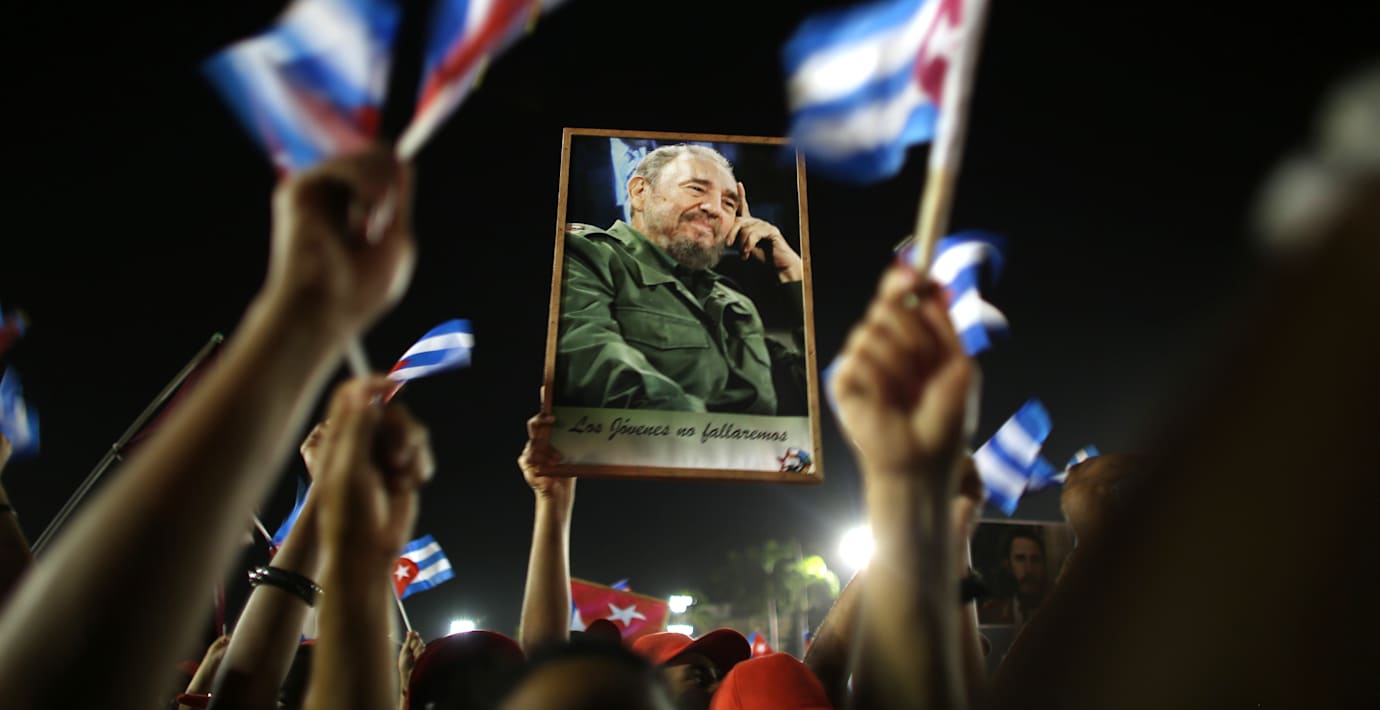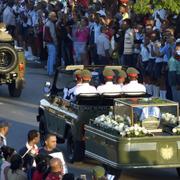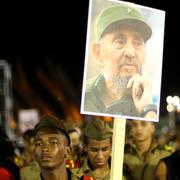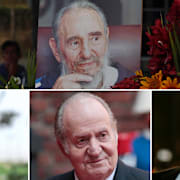
Efter nio dagars landssorg – i dag begravs Castro
Idag begravs Kubas tidigare diktator Fidel Castro i staden Santiago de Cuba, bredvid den kubanske författaren och befrielseledaren José Martí.
En enkel begravningsceremoni väntas inledas klockan sju på morgonen lokal tid. Sedan sätter Kuba även punkt för de nio dagars landssorg som utlystes efter kommunistledarens död.
I natt deltog tiotusentals kubaner och ledare från Latinamerika i en sista hyllningsceremoni för Castro i Santiago de Cuba. Få ledare från väst deltog, men Spaniens tidigare kung Juan Carlos var på plats, liksom Zimbabwes diktator Robert Mugabe och skådespelaren Danny Glover. Sverige representerades av ambassadören på Kuba.
bakgrund
Fidel Castro
Wikipedia (en)
Fidel Alejandro Castro Ruz (American Spanish: [fiˈðel aleˈhandɾo ˈkastɾo ˈrus] audio ; August 13, 1926 – November 25, 2016) was a Cuban politician and revolutionary who governed the Republic of Cuba for 47 years as Prime Minister from 1959 to 1976 and then as President from 1976 to 2006 (de jure until 2008). Politically a Marxist–Leninist and Cuban nationalist, he also served as the First Secretary of the Communist Party of Cuba from 1961 until 2011. Under his administration, Cuba became a one-party socialist state; industry and business were nationalized, and state socialist reforms were implemented throughout society.
Born in Birán, Oriente as the son of a nouveau riche sugarcane farm owner originally from Galicia, Spain, Castro adopted leftist anti-imperialist politics while studying law at the University of Havana. After participating in rebellions against right-wing governments in the Dominican Republic and Colombia, he planned the overthrow of Cuban President Fulgencio Batista, launching a failed attack on the Moncada Barracks in 1953. After a year's imprisonment, he traveled to Mexico where he formed a revolutionary group, the 26th of July Movement, with his brother Raúl Castro and Che Guevara. Returning to Cuba, Castro took a key role in the Cuban Revolution by leading the Movement in a guerrilla war against Batista's forces from the Sierra Maestra. After Batista's overthrow in 1959, Castro assumed military and political power as Cuba's Prime Minister. The United States opposed Castro's government, and unsuccessfully attempted to remove him by assassination, economic blockade, and counter-revolution, including the Bay of Pigs Invasion of 1961. Countering these threats, Castro formed an alliance with the Soviet Union. In response to U.S. nuclear missiles in Turkey, and perceived U.S. threats against Cuba, Castro allowed the Soviets to place nuclear weapons on Cuba, sparking the Cuban Missile Crisis—a defining incident of the Cold War—in 1962.
Adopting a Marxist-Leninist ideology, Castro converted Cuba into a pro-Soviet, one-party, socialist state under Communist Party rule, the first and only in the Western Hemisphere. Policies introducing central economic planning and expanding healthcare and education were accompanied by state control of the press and the suppression of internal dissent. Abroad, Castro supported anti-imperialist revolutionary groups, backing the establishment of Marxist governments in Chile, Nicaragua, and Grenada, and sending troops to aid allies in the Yom Kippur War, Ogaden War, and Angolan Civil War. These actions, coupled with Castro's leadership of the Non-Aligned Movement from 1979 to 1983 and Cuba's medical internationalism, increased Cuba's profile on the world stage. Following the Soviet Union's dissolution in 1991, Castro led Cuba into its "Special Period" and embraced environmentalist and anti-globalization ideas. In the 2000s he forged alliances in the Latin American "pink tide"—namely with Hugo Chávez's Venezuela—and signed Cuba to the Bolivarian Alliance for the Americas. In 2006 he transferred his responsibilities to Vice-President Raúl Castro, who formally assumed the presidency in 2008.
Castro is a controversial and divisive world figure. He is decorated with various international awards, and his supporters laud him as a champion of socialism and anti-imperialism whose revolutionary regime secured Cuba's independence from American imperialism. Conversely, critics view him as a dictator whose administration oversaw human-rights abuses, the exodus of a large number of Cubans, and the impoverishment of the country's economy. Through his actions and his writings he has significantly influenced the politics of various individuals and groups across the world.
Omni är politiskt obundna och oberoende. Vi strävar efter att ge fler perspektiv på nyheterna. Har du frågor eller synpunkter kring vår rapportering? Kontakta redaktionen


